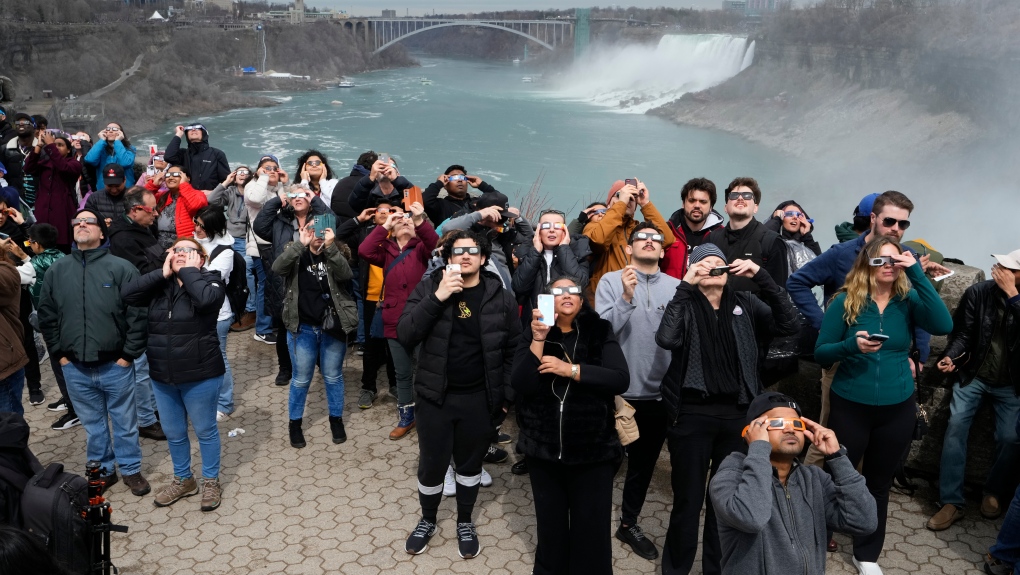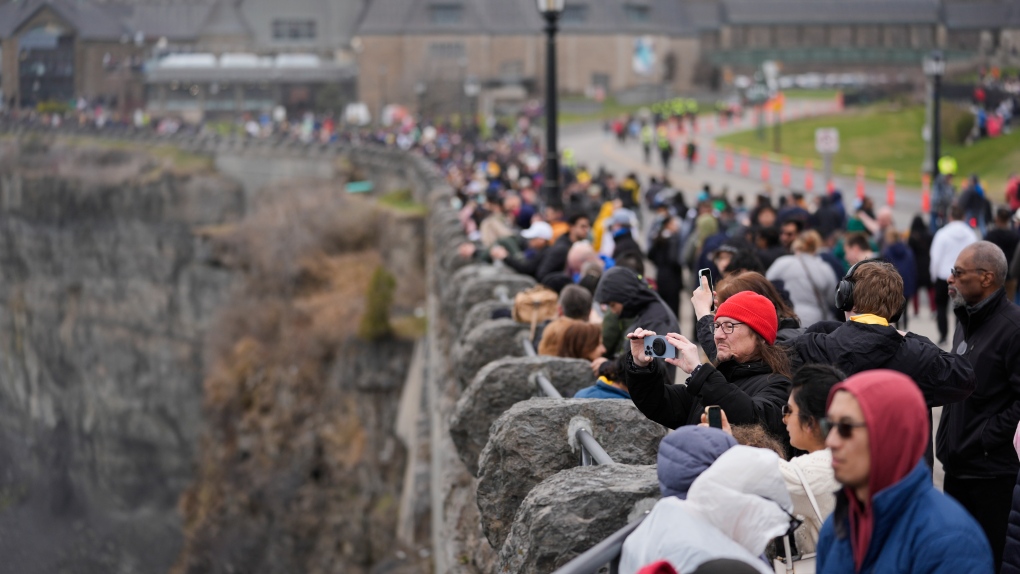State of emergency declaration, cloudy weather 'hampered' attendance at Niagara Falls eclipse viewing: mayor
The mayor of Niagara Falls says two things stood in the way of the expected one million people gathering in the city to watch the eclipse Monday: bad weather and a state of emergency declared by the region.
“People were concerned. They didn't want to bring their families into an area if it was declared a state of emergency,” Mayor Jim Diodati told CTV News Toronto in an interview on Tuesday, saying that the decision made last month had a “big downward push” on attendance.
More than 200,000 people did show up to take in the rare celestial event, he said, but that’s only one fifth of the crowd size the city was anticipating.
Due to its location in the path of totality, Niagara Falls was dubbed as one of the best places in the world to view the eclipse.
In the face of a potentially record-breaking number of visitors, Niagara Region declared a state of emergency on Mar. 29 “out of an abundance of caution.”
The region said at the time that the decision, which was made under the Emergency Management and Civil Protection Act (EMCPA), would strengthen the “tools” it had at its disposal and “safeguard the health and safety of residents and visitors” and protect critical infrastructure in “any scenario that might arise.”
The measure was lifted Monday afternoon after the eclipse event “concluded without incident.”
However, Diodati said the move “really hampered attendance” in a city that is in need of tourists four years after the COVID-19 pandemic.
 People gather to watch the total solar eclipse from Niagara Falls, Ontario, Monday, April 8, 2024. (AP Photo/Matt Rourke)
People gather to watch the total solar eclipse from Niagara Falls, Ontario, Monday, April 8, 2024. (AP Photo/Matt Rourke)
“I mean, you can't get the toothpaste back in the tube. The decision was made out of an abundance of caution. I understand the rationale. I don't necessarily agree with it. But here we are,” he said.
The declaration is also the subject of a legal challenge by the Canadian Constitution Foundation, which alleged the move was “unlawful” as it did not meet the statutory definition of “emergency” under the EMCPA.
Was the state of emergency declaration necessary?
While there was little that Niagara Falls could do about the rolling clouds that covered most of the sky on Monday, Diodati believes it could have pulled off hosting the eclipse event without state of emergency status.
“Oh yeah. We were ready. That's what we do in Niagara Falls. We pull off major events. We do them all the time,” he said.
“Obviously, having more hands on deck is better, we were clearly over prepared. And I'd rather be overprepared than underprepared, but we were definitely going to be in a good place without the state of emergency.”
Overall, Diodati said the event went off without a hitch, and while it’s too early to gauge the true economic impact, he said restaurants, hotels and attractions “were packed.”
 People gather under overcast skies in anticipation of watching the total solar eclipse from Niagara Falls, Ontario, Monday, April 8, 2024. (AP Photo/Matt Rourke)
People gather under overcast skies in anticipation of watching the total solar eclipse from Niagara Falls, Ontario, Monday, April 8, 2024. (AP Photo/Matt Rourke)
Beyond the operational success of the event, telecommunications in both Niagara Falls and Niagara-on-the-Lake were largely unaffected by the surge in visitors after both cities warned there could be a drop-off in cellphone reception.
On Tuesday, BCE Inc. said its Bell network saw five times the regular volume of traffic in cities throughout southern and eastern Ontario, including Niagara, while Rogers Communications Inc. said it saw six time the normal pressure on the network in Niagara Falls alone.
Both companies said their networks were prepared for the traffic and continued to run optimally due in part to portable mobile towers which were deployed in the area to increase capacity.
As well, the companies paused routine maintenance work that could have reduced service levels.
With files from The Canadian Press
CTV News Toronto is part of Bell Media, which is owned by BCE Inc.
CTVNews.ca Top Stories

BREAKING Prime Minister Trudeau to meet Donald Trump at Mar-a-Lago
Prime Minister Justin Trudeau has landed in West Palm Beach, Fla., on Friday evening to meet with U.S.-president elect Donald Trump, sources confirm to CTV News.
'Mayday! Mayday! Mayday!': Details emerge in Boeing 737 incident at Montreal airport
New details suggest that there were communication issues between the pilots of a charter flight and the control tower at Montreal's Mirabel airport when a Boeing 737 made an emergency landing on Wednesday.
Hit man offered $100,000 to kill Montreal crime reporter covering his trial
Political leaders and press freedom groups on Friday were left shell-shocked after Montreal news outlet La Presse revealed that a hit man had offered $100,000 to have one of its crime reporters assassinated.
Cucumbers sold in Ontario, other provinces recalled over possible salmonella contamination
A U.S. company is recalling cucumbers sold in Ontario and other Canadian provinces due to possible salmonella contamination.
John Herdman resigns as head coach of Toronto FC
John Herdman, embroiled in the drone-spying scandal that has dogged Canada Soccer, has resigned as coach of Toronto FC.
Musk joins Trump and family for Thanksgiving at Mar-a-Lago
Elon Musk had a seat at the family table for Thanksgiving dinner at Mar-a-Lago, joining President-elect Donald Trump, Melania Trump and their 18-year-old son.
Billboard apologizes to Taylor Swift for video snafu
Billboard put together a video of some of Swift’s achievements and used a clip from Kanye West’s music video for the song “Famous.”
Trudeau says no question Trump is serious on tariff threat
Prime Minister Justin Trudeau says incoming U.S. president Donald Trump's threats on tariffs should be taken seriously.
In a shock offensive, insurgents breach Syria's largest city for the first time since 2016
Insurgents breached Syria's largest city Friday and clashed with government forces for the first time since 2016, according to a war monitor and fighters, in a surprise attack that sent residents fleeing and added fresh uncertainty to a region reeling from multiple wars.

































